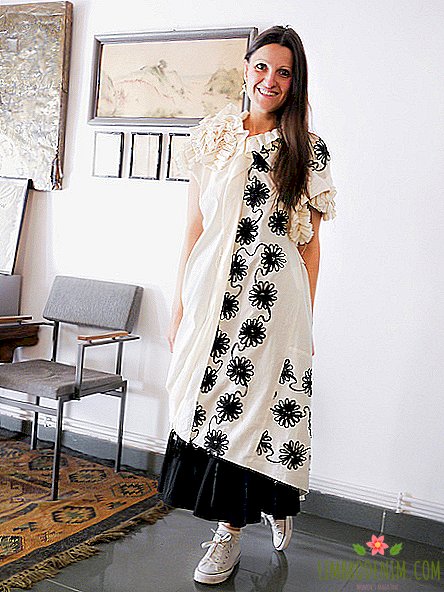Design boom: How I went to Seoul to study fashion on scholarships
It all started in 2012, when an excited friend called me and said that she accidentally found super-cheap tickets to China. Asia was of little interest to me then, but the offer sounded tempting, and I agreed. In Beijing, we settled with a familiar girl from Russia. That was the first time I saw a European who spoke fluently, not in familiar English or Spanish, but in the most complex Chinese. The locals were delighted with her. It was fascinating! I returned to Moscow with a firm decision to go and study one of the languages of Asia.

After a trip to Beijing, the soul was thirsty for Chinese, but it seemed too late to start it in my more than 20 years. Knowledgeable people claimed that Korean is much easier. Therefore, when I came across an ad for Korean courses, which were also free, I immediately enrolled in them. Classes were held twice a week. In the initial groups, there were so many who wished that there were not enough tables, however, more than half dropped out very soon.
In parallel with the study of Korean letters, which at first resembled hieroglyphs more, I excitedly read and watched everything I could find on the Internet about South Korea. As a person who has been in love with fashion since childhood, I quickly learned that there are incredibly talented fashion designers. The series is so high quality and stylish that it was impossible not to get hooked on them. The teachers at the language courses said that I had a talent, and constantly praised the pronunciation. One of them said that there is a scholarship of the South Korean government, which allows foreigners to study for free in the best universities of the country. I received this scholarship the second time. My parents were told about my crazy idea only after the embassy published an official list of students. Mom burst into tears, father supported. I didn’t ask them for a penny - the grant included tickets to Seoul and back, three years of study, insurance and a monthly stipend of nine hundred dollars. In August 2014, I flew to Korea to study fashion marketing. I was 26 years old.
South Korea is a small populous country with very high demands, quality standards and tough competition.
Immediately after arriving in Seoul, all foreigners were divided into language schools. The first year, the only subject we studied was Korean - five hours a day with a teacher, and then a lot of homework. The goal - to pass the language to a level that allows you to study at the university. Those who fail the final exam twice, return home. I still remember the unfortunate guys from Arab countries, to whom the Korean was harder than all the rest. They pounded him almost around the clock.
In our free time we were driven a lot around the country, which I liked more and more every day. I have never seen so many stylish people before - they were everywhere, especially in Seoul. Fashion is the second religion here. Hundreds of designer clothing stores for every budget, supermarkets with cosmetics and nail salons almost every corner. Here every second girl is a make-up specialist and a manicurist.
In Korea, it is very important to look good. Good looks are highly valued and greatly facilitate career growth and life in general. Therefore, Koreans are obsessively obsessive about being conventionally beautiful. Almost every girl dedicates to facial care for at least an hour a day. Plastic surgery to increase the incision of the eyes is one of the most popular gifts for graduation. The beauty is a white-skinned, slim, above average height Korean woman with doll features - the most beautiful western actress is called Emma Watson. Men follow the appearance of no less than girls. They care for the skin, increase the incision of the eyes, go to the gym and, of course, follow the main trends. The point is not to dress expensively and richly, but to make the image original and stylish.
Having successfully passed the language proficiency test, in August 2015 I began to study at the magistracy of Seoul University Yonse, which is one of the three best universities in the country. It was then that the dark side of Korean life first appeared before me in all its glory, and rose-colored glasses began to subside. “All foreigners who came to my department returned home without having finished their studies — they could not stand it,” with these words the scientific adviser met me, who then repeated them in different variations for several months.
South Korea is a small populous country with very high demands, quality standards and tough competition. Local people are constantly intensively studying and passing some exams: school, university, for the right to apply for a particular position, and so on. They start their struggle for a place in the sun almost from childhood and continue their whole life. In order to get a job in the best national companies like Samsung, a Korean diploma is often not enough, it also requires an American one.
On average, I spend 10 hours a day at the university. If I do not have lectures or seminars, I should be in the department, where the professor always has assignments for us. Basically, we read or we ourselves conduct research on very narrow topics, study the mechanisms of interaction between companies and consumers, and how a marketing move affects sales and success.
Falling in love with a poor artist and running away with him is not about Korea. Nobody canceled mutual sympathy, but they will look at the bank account, family and career success first
In Korea, everything is subject to the principle of utility. If, for example, in Russia we call an educated person erudite, with a broad outlook, an interesting conversationalist, then in Korea he is the one who passed the exam for “excellent”. Most would never think to read a book simply because it is interesting and pleasant. Many will not just go to the exhibition or to the theater. The Koreans have neither the strength, nor the time, nor the habit.
After one incident, I clearly realized that relationships and marriage for many Koreans are also part of a business plan. One of my friends liked a guy who obviously did not reciprocate her. I absolutely sincerely wished her to score on him and find someone who would love and appreciate her. "What old-fashioned you are! What kind of love? Who needs it now? It just suits me by status," she stunned me. Falling in love with a poor artist and running away with him is not about Korea. Nobody canceled mutual sympathy, but they will look at the bank account, family and career success first of all. Maybe that's why there are so many divorces.
With regard to sex in Korea, everything is generally hard and covered with a thick layer of hypocrisy. Local stars and politicians promote the cult of purity and innocence, and publicly state that in their 20, 30, 40 years they almost never even kissed. It is considered completely unacceptable to live together before the wedding, but hotels that rent out by the hour are very popular. It is impossible to have an affair for one night with a Korean woman, and if it has already happened, young people are obliged to start dating, even if they both don’t really want to. That's probably why there are so many couples on the streets of Seoul. Sometimes it seems to me that there are no people here at all who would go alone. If you for one reason or another do not have the second half, then on holidays or on weekends you feel extremely uncomfortable.
Koreans are classic consumers. A cliché lifestyle with hours of shopping and the obligatory calling at Starbucks - this is what they like to do. In the evening, it is customary to meet with friends in a cafe, buy food, alcohol and get very drunk - this is how the whole local youth spends their weekends. From alcohol they drink light sweetish rice maccoli, similar to potato or soju tincture and a lot of beer. With a 24-hour workday and constant stress, this is the most affordable way to relax. Koreans love parties, but never arrange their homes. They maintain distance with unfamiliar people for a long time. It takes them a lot of time to start trusting another or truly making friends. Only close people are invited to visit, and if this happens, the hosts will do everything to make you as tasty, comfortable and pleasant as possible.
For more than two years in South Korea, I managed to learn well the local reality, in which there is a lot of annoying. Despite this, after graduation I plan to stay here to live. My diploma from the Faculty of Philosophy of Moscow State University in Moscow is practically useless, and in South Korea, as a master of Yonse University, I can apply for almost any marketing position in the fashion industry, where I have always dreamed of working.
I admire the complete absence of racism in Seoul. Any foreigners are welcome here. This is a crossroads of worlds and cultures, where I met and became friends with the guys from South America, USA, Asia and Europe. I have never in my life communicated with people from so many countries as now. And, of course, South Korean security is priceless. You can leave the front door open, the car, wander around the street at night, and nothing will happen. Recently, one woman threw a large amount of money out of the window - the police returned her everything to the last bill. Going to a cafe in Seoul, we occupy a table, leave the phone on it, and, no matter how expensive it is, no one would ever think to appropriate it.
Photo: jdavenport85 - stock.adobe.com, personal archive





